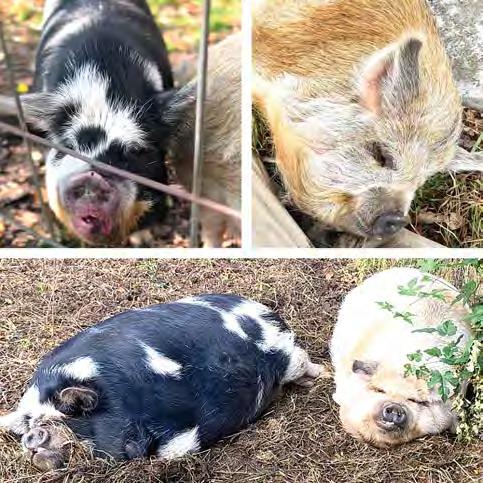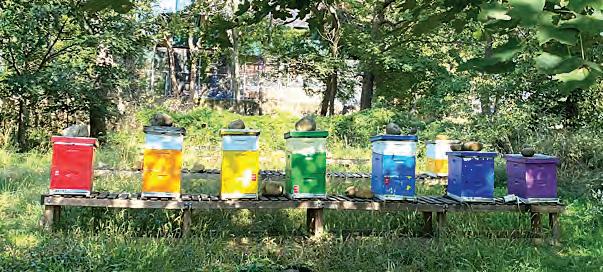
6 minute read
QCFM DETERIORATING UNDER Workers decry unkempt grounds, ED’s
by Sophie Krichevsky Associate Editor
Past and present employees of the Queens County Farm Museum say the once-prized borough institution has gone to seed under the leadership of its executive director of five years, Jennifer Walden Weprin, as her demeanor and lack of understanding and knowledge of agriculture have led to high turnover and damage to the farm.
Under Walden Weprin’s tenure, say the employees, gardens have become unkempt, animals have suffered and morale among staff has plummeted. Employees were denied cost-of-living pay hikes for several years.
The situation was relayed through the accounts of those employees who, among a number of the farm’s roughly 50 staff members and their predecessors, shared their experiences at a farm Board of Directors meeting in July. The Chronicle has obtained copies of their testimony and has spoken further with nine of the past and present employees, all of whom were granted anonymity due to fear of retaliation.
Since that meeting, employees say, the board has been weighing the future of Walden Weprin’s contract, which expires at the end of the year.
“Even though I quietly may not have agreed with some things Amy Boncardo did, I respected her as the then-director and had many friendly conversations with her,” Employee No. 1 wrote in a statement to the board, referring to the QCFM’s longtime former leader. “I cannot say that now ... To this day I doubt [Walden Weprin] even knows my name.” Employee No. 1 was not the only one who told the Chronicle the latter.
The Chronicle contacted Walden Weprin and her lawyer for comment early last week, before initially publishing this story online last Thursday, and was referred to two farm associates who could answer questions about some of the agricultural concerns raised and who could speak positively to Walden Weprin’s character, as well as the farm’s spokesperson, Crystine Nicholas.
In an email to the Chronicle, Nicholas wrote that the farm’s statement was “a response to the barrage of allegations from unnamed sources and most likely disgruntled employees who may not embrace the changes needed to make the QCFM the gem it is today, the most visited cultural institution in Queens.”
The Farm Museum was established in 1975, two years after Jim Trent — who serves as president of the Board of Directors to this day — and then-state Sen. Frank Padavan saved the site from development, doing so in part by getting the Adriance Farmhouse landmark status (most of the land itself became city parkland). The oldest building on the farm’s property, for years the house has been a main attraction for visitors, who had the chance to tour the site and to see 18th-century farm equipment up close every weekend. It also houses the farm’s education department.
While on the outside, the farmhouse may look the same, much has changed. The education space on the first floor is being used primarily as storage. The agriculture department took over the second floor after it was moved out of the barn, employees say. Tours are no longer offered every weekend, but only on select days throughout the year (they were canceled during the pandemic; the old schedule was never restored). The same can be said of the farm as a whole — one does not need to look that far below the surface to see that things have changed.
That is what motivated employees to speak up. “I’m not doing this because I have a grudge or vendetta — I’m doing this because I love the farm, and it’s painful to see what’s going on,” Employee No. 1 told the Chronicle. “Despite the other things about bad management and how we haven’t been treated the way we all deserve, for me, I think this is the beginning of the end.”
In Nicholas’ lengthy statement to the paper, responding to several allegations against Walden Weprin, Nicholas wrote, “Over the last five years, under the leadership of Executive Director Jennifer Walden-Weprin, the Queens County Farm Museum has formalized new policies and protocols, stabilized finances, hired independent auditors, and modernized antiquated systems despite Covid business interruptions which has all contributed to the Farm becoming the most visited cultural institution in Queens. QCFM has undergone the largest agricultural expansion in over 50 years, providing greater and more equitable access to healthy foods throughout the region. Through all of this, QCFM is committed to diversity, equity, inclusion and access. QCFM’s guiding principle is that the public should see themselves in farm programs, staff and leadership. That is truly how the organization can best serve NYC and, of course, Queens, the most diverse borough in the world.”
Who is Jennifer Walden Weprin?
Walden Weprin is well connected. She is married to former Assemblyman and Councilman Mark Weprin, who, along with current Assemblyman and ex-Councilman David Weprin (D-Fresh Meadows), is the son of the late Speaker of the Assembly Saul Weprin. She became executive director in October 2018 after wrapping up a two-year stint as director of cultural affairs and tourism for then-Borough President Melinda Katz. Before that, she led the marketing departments at the Louis Armstrong House
Museum, the Great Neck Arts Center and Queens Theatre.
From day one, employees say, her marketing background has been central to Walden Weprin’s approach, and was even exciting to some. But the image of the farm she produced was not necessarily an accurate one.
The farm refers to itself on its website as home to the largest single apiary in New York City. Walden Weprin has as well, even doing so in an interview with the Chronicle earlier this year. But despite partnering with Cornell University’s Dyce Lab for Honey Bee Studies in 2020 to put together the largest one in the Big Apple, which was to be composed of 50 hives with more than 2 million bees, according to Employee No. 2, the farm has never had more than 26, though Andrew Coté, a beekeeper who works with the farm, disputed that, saying there were 46 at one point. Both Coté and Employee No. 2 said, however, that the number now is down to eight. The accompanying translucent display, covered in old honey, cannot be seen through anymore, photos from employees show.
Why there were never 50 hives is unclear, though Coté said, “Fifty was probably the number that we were aiming for, but it’s true, we never got above 46.” Coté said many hives were removed from the site this summer so as to tamper down a disease that was spreading among them, and that he expects to bring them back from his own farm in Connecticut in March.
“It was the single largest apiary for about three years, but we got pretty blasted this year with winter losses,” he told the Chronicle. Asked about the claim again later, he said, “I don’t think you’re told a lie — I think maybe we can update the website.”

Coté is not a farm employee; he told the Chronicle he volunteers at the museum, in part because he is grateful he was allowed to store bees there during the pandemic, when many city buildings wanted beekeepers to remove their hives from their property. “They’re legit — honestly, I wouldn’t work with [QCFM] if they weren’t legit,” he said. “ I don’t know Jennifer so well. But she’s been cool with me. She gives me a free hand with the bees, she recognizes that I know that, and lets me do it.”
That is not how other present and past employees at the farm characterize Walden Weprin — far from it.
“She would see an opportunity for fundraising or for publicity, and say, ‘We want that,’ and then try to reverse engineer whatever it was we were doing at the farm to fit that,” Former Employee No. 1 said.
That ex-farm worker pointed to the 2019 rebranding of the former Children’s Carnival as an example. “She wanted a more agricultural sounding name, and because the Children’s Carnival happened in the orchard, she wanted to call it an Apple Blossom Festival,” Former Employee No. 1 said. “Well, the apple trees don’t blossom until a full month after that carnival.”
The same employee said Walden Weprin did not seem very interested in the farm itself. “She was very engaged in the world of public relations, and networking and political connections, and very interested in leveraging those connections to raise the profile of the farm, which is all great,” Former Employee No. 1 said. “But that was all she was interested in doing.”
In fact, several workers said they rarely saw Walden Weprin around the property. And that was true even before the pandemic began, Employee No. 2 said. Former Employee No. 1 recalled the executive director eating alone during the first holiday party under her leadership. Employee No. 1 remembered leading a session with students shortly before then, during which Walden Weprin came to observe, unannounced. “I kept thinking to myself, ‘Oh, is that the new director? I’m not really sure. Is that a parent? Should I tell them to get out?’” Employee No. 1 said.
When Walden Weprin is at the farm, often, it’s when press or VIPs are, too, the workers said. “We’d see her when she was doing her little press conferences,” Employee No. 1 said. “That’s when you’d see her — when she’s getting pictures taken.” When the press joins her at the farm, Walden Weprin is careful about










